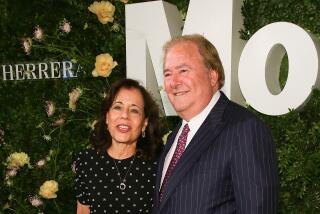Global Crossing Founder Settles Suit by Ex-Partner
- Share via
Global Crossing Ltd. founder Gary Winnick on Friday settled a lawsuit brought by ex-partner Douglas Shooker, who claimed Winnick owed him up to $1.1 billion under an oral agreement granting him a 15% slice of venture capital profits.
Terms were not disclosed. The settlement brought an abrupt end to deliberations by a Los Angeles County Superior Court jury, which met for a fifth day Friday without reaching a verdict.
“I’m glad this is over. It was a fair effort, I had excellent representation, and don’t recommend anybody go through this,” a smiling Winnick said after the accord was announced in Judge Victor E. Chavez’s courtroom.
“In the end, a business solution was the best way to go,” said Terry Christensen, who along with Patricia Glaser represented Winnick in the three-week civil trial.
Shooker and his attorney, Don Howarth, declined to comment.
Shooker became affiliated with Winnick’s Beverly Hills investment firm, Pacific Capital Group Inc., in 1993 and said Winnick promised him a share of the profits from any company to emerge from their efforts.
Shooker left a year later but said one of the companies launched during his tenure was Telecommunications Development Corp., which he said was the forerunner of Global Crossing.
Global Crossing went public in 1998 and became a stock market darling. It operated a fiber optic cable network that reached across the Atlantic and the Pacific to 200 cities in 27 nations.
Winnick, a former junk bond trader at defunct investment banking firm Drexel Burnham Lambert, raised billions of dollars and cashed in some of his highflying stock for more than $575 million before Global Crossing went bust. At one point, Winnick was listed as Los Angeles’ richest person, worth an estimated $6 billion.
Winnick and his lawyers said that although Shooker was ostensibly a managing partner at Pacific Capital, in reality there was little more than an “office-sharing arrangement.”
They said there was no 15% profit deal.
Shooker was given office space and business cards in exchange for exposing Winnick to deals, the defense said. It was up to Winnick to give Shooker “profit participation,” Glaser said.
But she said that Shooker never brought Winnick any viable deals and that Telecommunications Development “was a small, passive investor in Global Crossing -- it did not become Global Crossing.”
“It is as if Mr. Winnick had invited Mr. Shooker to dinner at his house,” Glaser said in closing arguments, “and now he is claiming a piece of the house.”
One juror said she was not convinced Shooker had a case.
“The sticking point was that some of us could see no evidence of what was in the oral agreement,” juror Jean Eldrege said.
*
Times staff writer James S. Granelli contributed to this report.




